Intel Core i3-8100 Benchmarks
For this exercise, we are using our legacy Linux-Bench scripts which help us see cross-platform “least common denominator” results we have been using for years as well as several results from our updated Linux-Bench2 scripts. At this point, our benchmarking sessions take days to run and we are generating well over a thousand data points. We are also running workloads for software companies that want to see how their software works on the latest hardware. As a result, this is a small sample of the data we are collecting and can share publicly. Our position is always that we are happy to provide some free data but we also have services to let companies run their own workloads in our lab, such as with our DemoEval service. What we do provide is an extremely controlled environment where we know every step is exactly the same and each run is done in a real-world data center, not a test bench.
We are going to show off a few results, and highlight a number of interesting data points in this article.
Python Linux 4.4.2 Kernel Compile Benchmark
This is one of the most requested benchmarks for STH over the past few years. The task was simple, we have a standard configuration file, the Linux 4.4.2 kernel from kernel.org, and make the standard auto-generated configuration utilizing every thread in the system. We are expressing results in terms of compiles per hour to make the results easier to read:
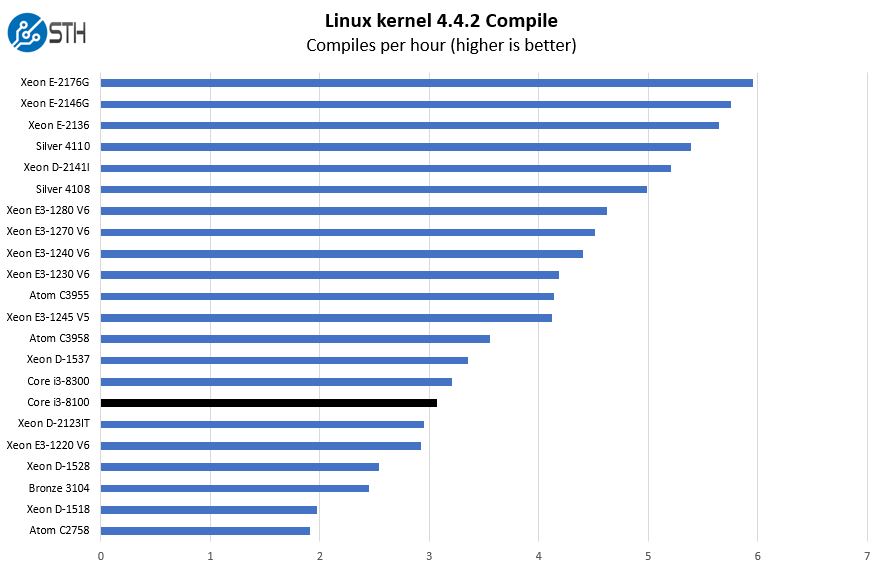
Clock speed is still important. This $117 CPU is out-performing a $213 Intel Xeon D-2123IT. That is not entirely fair as the Intel Xeon D-2123IT has onboard 10GbE as well as its PCH. If you, however, are building a server with 1GbE and two SATA hard drives, saving that $96 can be important.
c-ray 1.1 Performance
We have been using c-ray for our performance testing for years now. It is a ray tracing benchmark that is extremely popular to show differences in processors under multi-threaded workloads. We are going to use our 8K results which work well at this end of the performance spectrum.
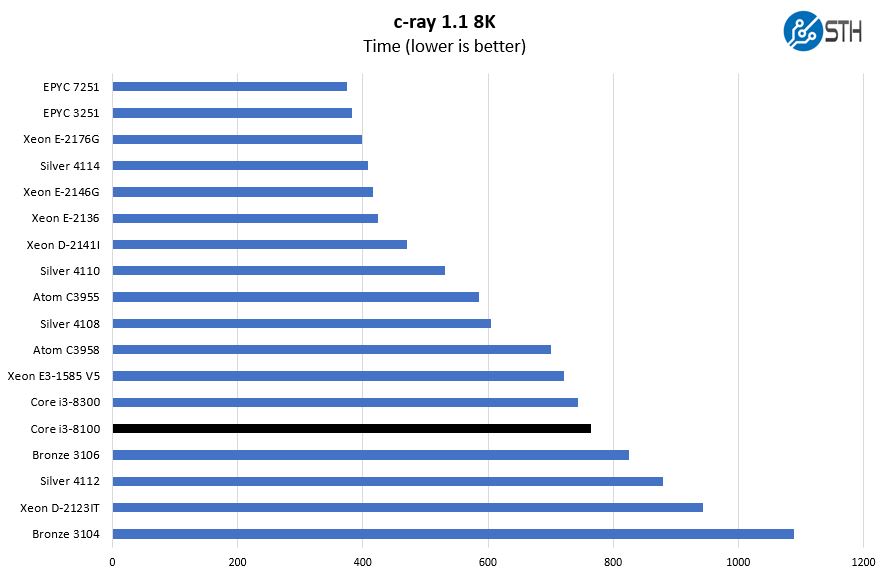
Simply having a high base clock speed, no hyper-threading, and Intel’s current cache architecture means that the chips are faster than many higher-cost and higher core count offerings. If you had a small database and little need for high-capacity RAM support, this is a better option than the Intel Xeon Silver 4112 in many cases, even at a quarter of the cost. Of course, the Intel Xeon Silver 4112 can scale to significantly more RAM and has additional platform and RAS features. If you are on an extremely tight budget, the Core i3 can work.
7-zip Compression Performance
7-zip is a widely used compression/ decompression program that works cross-platform. We started using the program during our early days with Windows testing. It is now part of Linux-Bench.
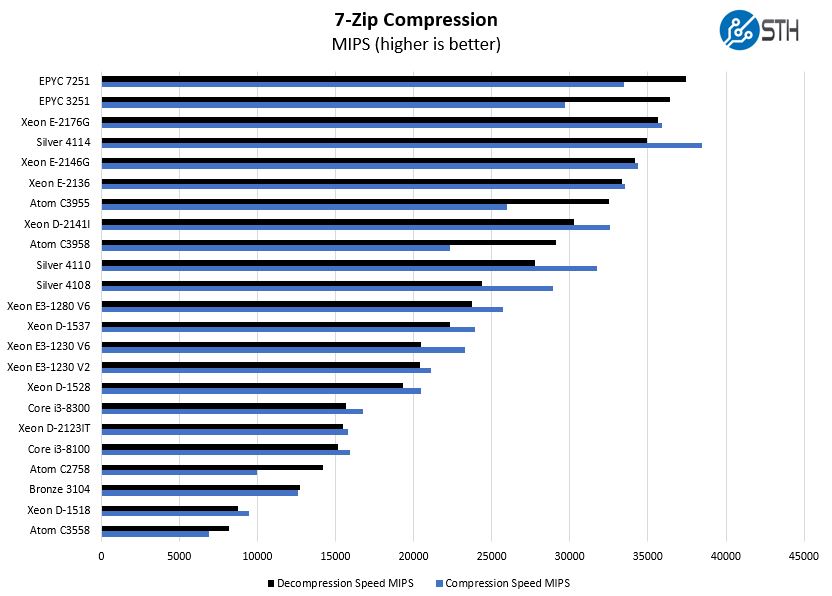
In terms of compression performance, we again see the Intel Core i3-8300 maintain a notable performance lead. It is worthwhile to ponder whether adding a few more dollars is worth additional CPU performance.
NAMD Performance
NAMD is a molecular modeling benchmark developed by the Theoretical and Computational Biophysics Group in the Beckman Institute for Advanced Science and Technology at the University of Illinois at Urbana-Champaign. More information on the benchmark can be found here. We are going to augment this with GROMACS in the next-generation Linux-Bench in the near future. With GROMACS we have been working hard to support Intel’s Skylake AVX-512 and AVX2 supporting AMD Zen architecture. Here are the comparison results for the legacy data set:
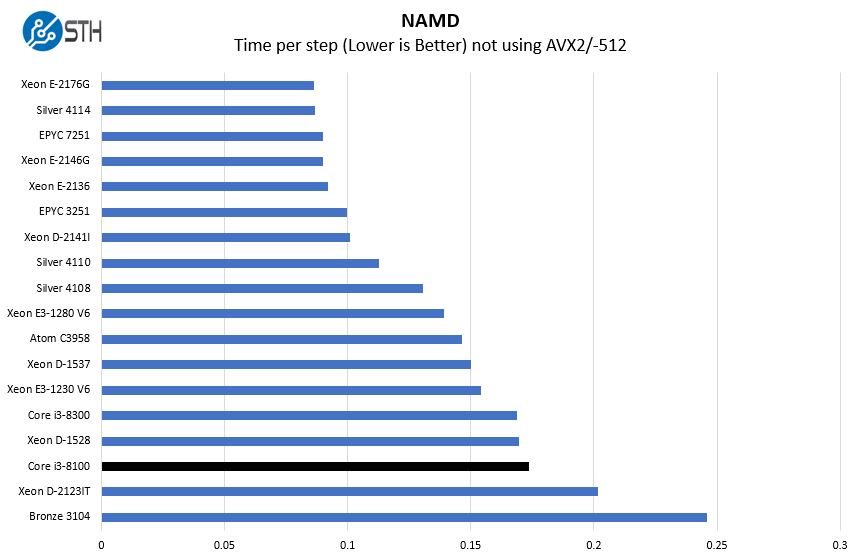
HPC applications like NAMD and benchmarks like Linpack tend to perform better with hyper-threading turned off. Here the lack of hyper-threading and high clock speeds pay off making it almost equivalent to a 6-core Intel Xeon D-1528 CPU in terms of performance.
Sysbench CPU test
Sysbench is another one of those widely used Linux benchmarks. We specifically are using the CPU test, not the OLTP test that we use for some storage testing.
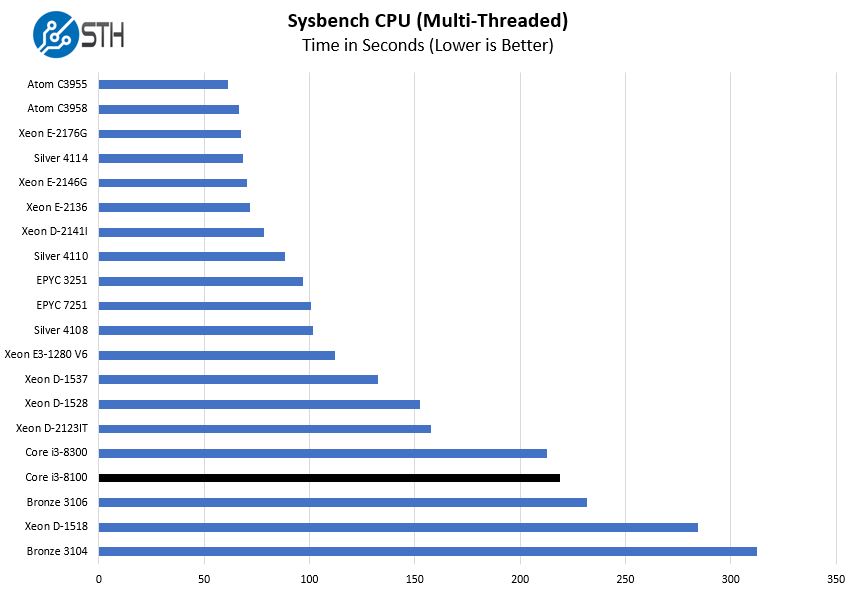
The lack of threading hurts the chip in multi-threaded performance. You can see a huge gap even between the Intel Core i3-8100 and the older generation Intel Xeon E3-1280 V6.
OpenSSL Performance
OpenSSL is widely used to secure communications between servers. This is an important protocol in many server stacks. We first look at our sign tests:
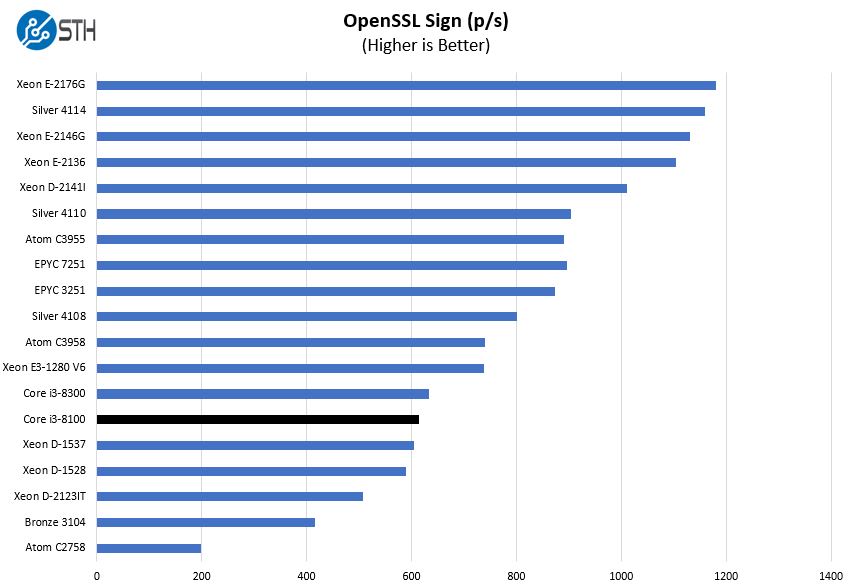
Here are the verify results:
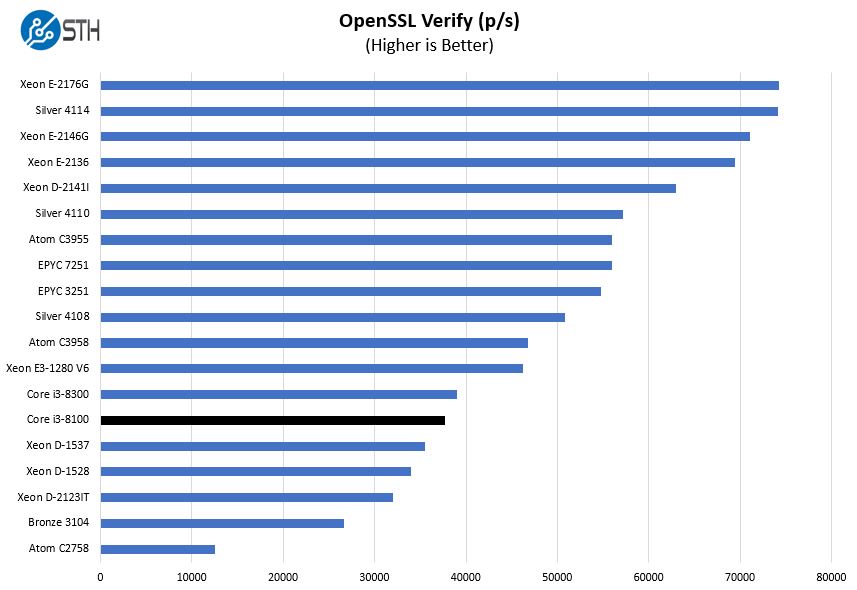
This is an area where Intel has seen benefits from architectural improvements. High clock speeds, newer microarchitecture, and no turbo clocks mean that the Intel Core i3-8100 performs very well here.
UnixBench Dhrystone 2 and Whetstone Benchmarks
Some of the longest-running tests at STH are the venerable UnixBench 5.1.3 Dhrystone 2 and Whetstone results. They are certainly aging, however, we constantly get requests for them, and many angry notes when we leave them out. UnixBench is widely used so we are including it in this data set. Here are the Dhrystone 2 results:
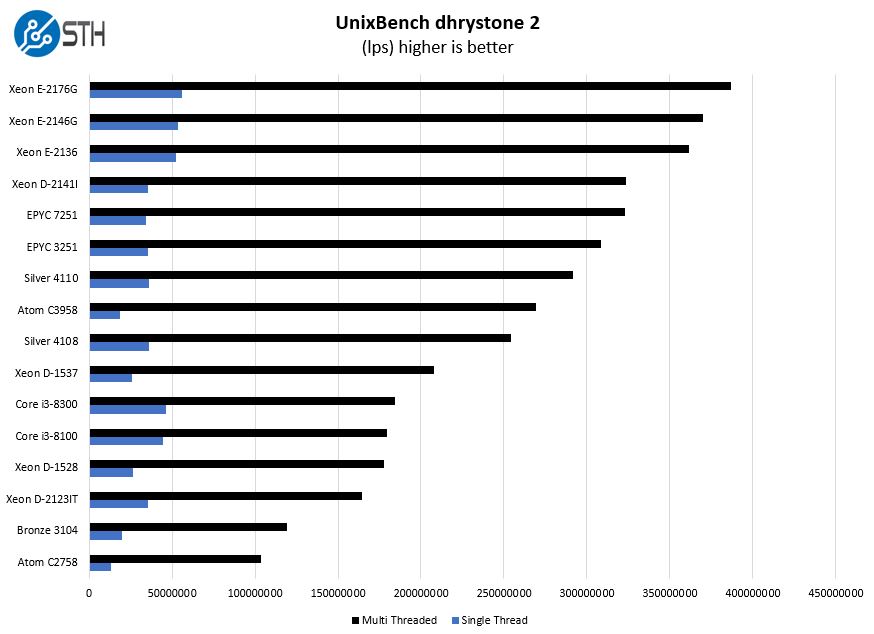
Here are the whetstone results:
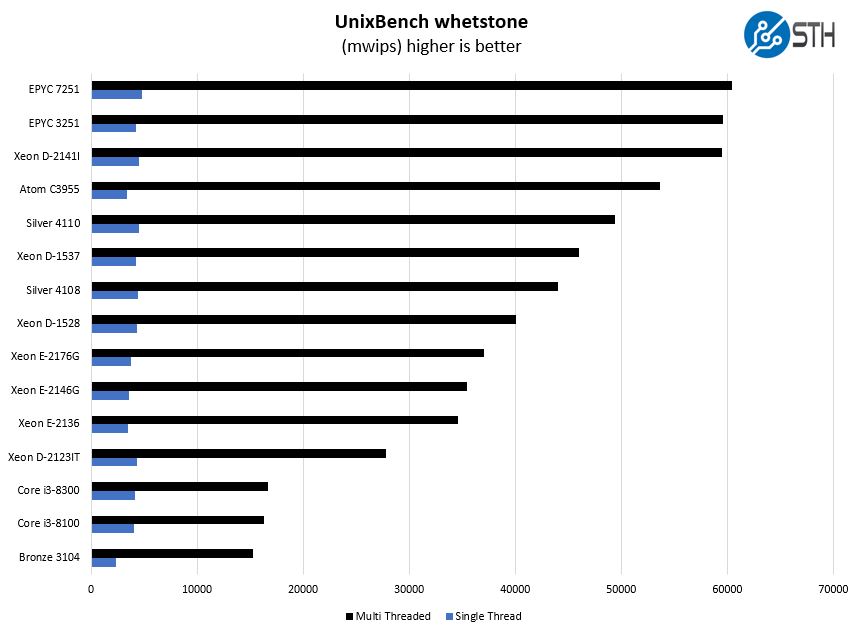
When you look at the dhrystone 2 results, you can see the excellent single threaded performance more clearly. Even at one-quarter of the price, the 3.6GHz clock is something that the Intel Xeon Silver line cannot match.
GROMACS STH Small AVX2/ AVX-512 Enabled
We have a small GROMACS molecule simulation we previewed in the first AMD EPYC 7601 Linux benchmarks piece. In Linux-Bench2 we are using a “small” test for single and dual socket capable machines. Our medium test is more appropriate for higher-end dual and quad socket machines. Our GROMACS test will use the AVX-512 and AVX2 extensions if available.
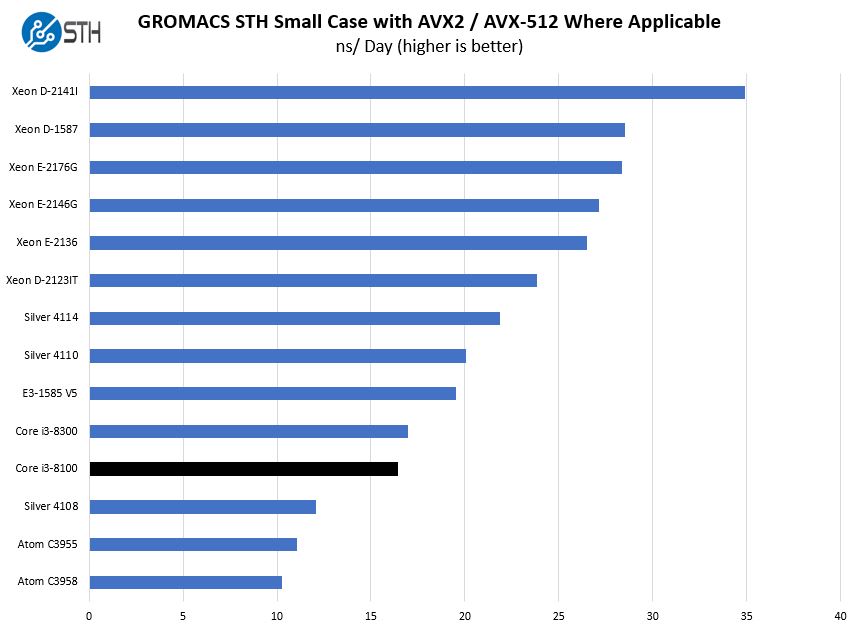
This is not the CPU you would want for GROMACS, but performance again clocks in at a very respectable level. On the lower end, you can see that four higher clocked and more robust cores can show a large performance gap over sixteen lower power cores with the Intel Atom C3955 as an example.
Chess Benchmarking
Chess is an interesting use case since it has almost unlimited complexity. Over the years, we have received a number of requests to bring back chess benchmarking. We have been profiling systems and are ready to start sharing results:
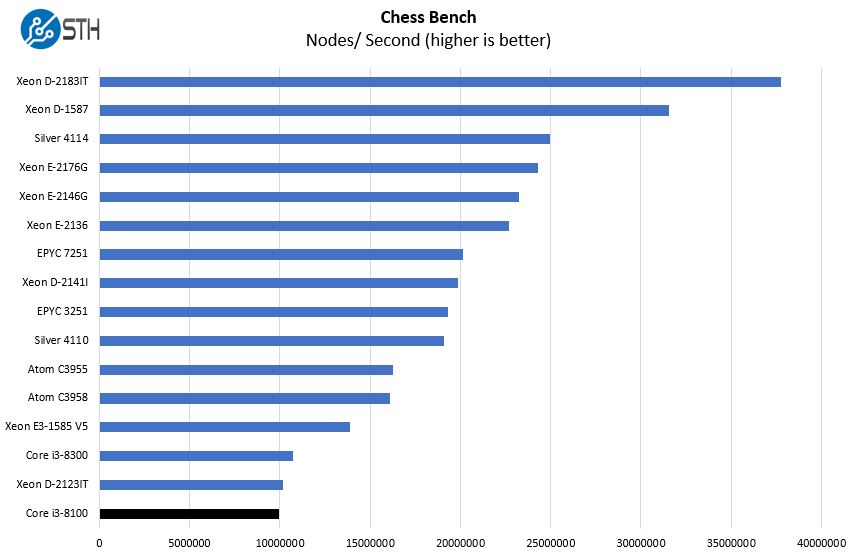
This is not the most impressive result for the Intel Core i3-8100. Here you can see the lower speed Intel Xeon D-2123IT cores with hyper-threading are able to notch a performance victory. Clock speed cures a lot, but not everything.
Next, we are going to have the power consumption, market positioning, and our final words.

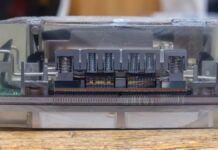
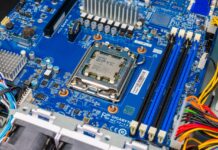

Any idea if these chips will run VMware and if they support lower EVC levels? I might like to add one of these to my homelab, which has a pair of Haswell-generation E3-based ESXi servers, but I’m not sure if the i3-8100/8300 would play nicely with them. VMware’s compatibility chart doesn’t have any 8th gen CPUs on it yet as far as I can see – not even the E-2100 CPUs.
Not sure about EVC but I did manage to setup ESXi (free) 6.7 on an i3-8100 + Gigabyte H370N-WiFi mobo without any major issues.
ESXi picks up the i211 NIC on the board but not the i219 though.
I use AMD processors with unbuffered ECC memory. I have used the Phenon II 940 with an Asus motherboard which supports ECC. More recently, I got a AMD FX-8320E and an Asus motherboard.
This is a much cheaper and more flexible solution than a few i3 processors that Intel allows to support ECC.
Phenom? 8)
FX-8320E, 95 W, PassMark 7540, about $89 [Ebay, used]
i3-8100, 65w, PassMark 8095, about $135 [NewEgg]
FX-8320E is interesting from a value proposition … but DDR3, ECC support? I’m still looking, no IPMI, and the real problem is s/w where Ryzen is only just seeing ESXi
https://www.servethehome.com/amd-ryzen-working-with-vmware-esxi-6-5/
i3-8100 costs more up-front, but will last longer & consume less power [which is expensive in CommunistFornia].
Granted, motherboard options could be better. What, no 10GBe?
I paid $50 for my FX-8320E with an Asus motherboard last black friday from microcenter, new with warranty.
All AMD processors that I know of, other than the A series support ECC.
As for used processors, last month I bought two xeon L5640’s on ebay for $20 shipped. Certainly a much better deal than the i3, and only 50w TDP each. I am sure the motherboards for the L5640 are a bit less power efficient than newer motherboards.
Again, 8320e IS interesting from a value perspective. Keep in mind “ECC support” there means you can put ECC memory in and it’ll work, but does NOT necessarily mean if there’s an error then an exception gets thrown [which kind of defeats the whole purpose].
Xeon L5640, 60w, PassMark 9717, $35 – $40 used
that’s pretty damn good 8) In fact, the value proposition here is absurdly better. Would have to add 10GBe NIC, but still….
The 3 asus motherboards I have do not log ECC errors, so it is unclear how much ECC support they have. My supermicro and old intel server motherboards *do* log ECC errors.
It was $20 shipped for *two* L5640’s. I paid about that much for each supermivro cooler with fan…
The article states that the i3-8100 idles at around 32 watts with a maximum power consumption of 88 watts. Is the power consumption for the whole system or just the cpu?
They always have done wall power not CPU power